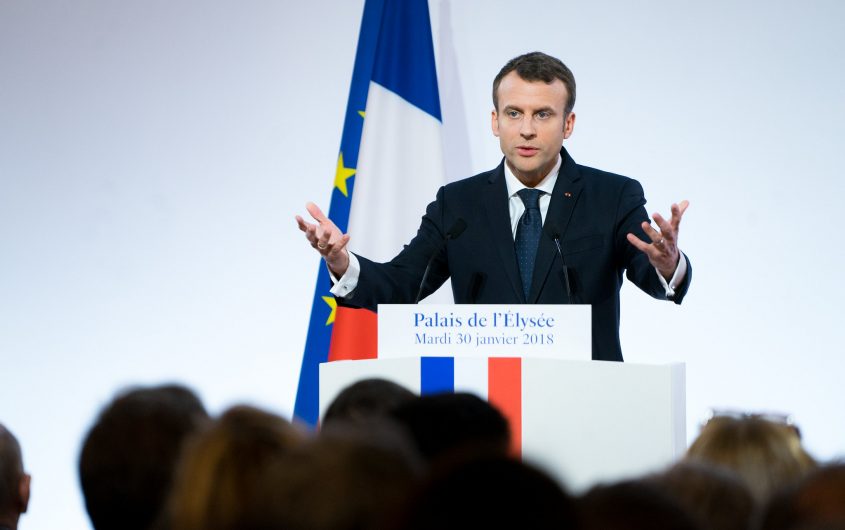
Jacques Paquier via Flickr
As Europe Readies to Recalibrate Its Relationship with China, Should It Look to Paris Instead of Berlin?

Yixiang Xu
China Fellow; Program Officer, Geoeconomics
Yixiang Xu is the China Fellow and Program Officer, Geoeconomics at AGI, leading the Institute’s work on U.S. and German relations with China. He has written extensively on Sino-EU and Sino-German relations, transatlantic cooperation on China policy, Sino-U.S. great power competition, China's Belt-and-Road Initiative and its implications for Germany and the U.S., Chinese engagement in Central and Eastern Europe, foreign investment screening, EU and U.S. strategies for global infrastructure investment, 5G supply chain and infrastructure security, and the future of Artificial Intelligence. His written contributions have been published by institutes including The Chinese Academy of Social Sciences, The United States Institute of Peace, and The Asia Society's Center for U.S.-China Relations. He has spoken on China's role in transatlantic relations at various seminars and international conferences in China, Germany, and the U.S.
Mr. Xu received his MA in International Political Economy from The Josef Korbel School of International Studies at The University of Denver and his BA in Linguistics and Classics from The University of Pittsburgh. He is an alumnus of the Bucerius Summer School on Global Governance, the Global Bridges European-American Young Leaders Conference, and the Brussels Forum's Young Professionals Summit. Mr. Xu also studied in China, Germany, Israel, Italy, and the UK and speaks Mandarin Chinese, German, and Russian.
__
France’s recent decision to effectively ban the Chinese telecommunications company Huawei from its 5G network by 2028 came on the heels of the UK’s announcement to purge Huawei’s 5G equipment by 2027. These developments are the latest signals that European attitudes toward China have hardened further since the beginning of the novel coronavirus pandemic. According to a recent survey, public opinion on China shifted significantly into negative territory since the onset of the pandemic, with a majority of respondents characterizing China’s rising influence in global affairs as a negative development (58% in France and 61% in Germany).
China’s aggressive pandemic propaganda campaign, its imposition of a new national security law on the special administrative region of Hong Kong, and its continuing incarceration of millions of ethnic Uyghurs in Xinjiang are key factors driving the public opinion change in Europe. At the same time, a sense of “promise fatigue” has set in for the EU which has hitherto focused on economic engagement with China. The EU’s demand for domestic economic reforms that would further open up the Chinese market for trade and investment and grant foreign companies reciprocal treatment has not materialized. As hopes for the EU-China Comprehensive Agreement on Investment dwindle, Beijing’s call for everlasting dialogues increasingly seems merely a delaying tactic.
As hopes for the EU-China Comprehensive Agreement on Investment dwindle, Beijing’s call for everlasting dialogues increasingly seems merely a delaying tactic.
Since dubbing China as a systemic rival in 2019, the EU has moved quickly to strengthen its regulatory regime to counter China’s disruptive economic practices, rolling out the EU FDI Screening Resolution and a White Paper on foreign subsidies in the single market. Brussels is also preparing to push back against Beijing’s imposition of the new national security law in Hong Kong with a “coordinated package.”
Yet, some in Europe don’t see the need to change their approach to China. In Germany, Chancellor Merkel seems determined to hang on to the Wandel durch Handel, or change through trade, fallacy. German economy minister Peter Altmaier recently defended Berlin’s mute response on China’s crackdown in Hong Kong and insisted that the current course of Germany’s appeasement policy can deliver changes in China. But the Merkel government’s China stance is being challenged both at home and in Brussels. To some, the chancellor’s call for the EU to speak to China with one voice amounts to little more than pushing Berlin’s priority for preserving its close economic ties with China without rocking the boat.
So, should Europe look to France rather than Germany to chart a new course for its relationship with China?
Unlike Chancellor Merkel, President Macron seems to have “evolved” on his views of China. On his first official visit to the Middle Kingdom in January 2018, Macron offered the Chinese the opportunity to cooperate to “throw a brick to get jade (抛砖引玉),” and declared that he would play a leading role to unite Europe as a solid interlocutor for China’s Belt-and-Road Initiative. Returning to China in November 2019, Macron secured an estimated $15 billion worth of bilateral commercial deals but skirted contentious issues such as trade liberalization and subsidies to State-owned enterprises.
Fast forward to April 2020. As the COVID-19 pandemic ravaged Europe, the French president criticized China’s pandemic response, stating “Let’s not be so naïve as to say it’s been much better at handling this. There are clearly things that have happened that we don’t know about.” French foreign minister Jean-Yves Le Drian summoned the Chinese ambassador to Paris to protest the embassy’s aggressive pandemic information campaign denigrating western democracies’ management of the crisis while touting China’s success.
Paris is also taking a tougher stance to uphold western democratic values in bilateral relations with Beijing. In early July, Le Drian announced before the French Senate Foreign Affairs Committee that the government was considering measures to respond to recent Chinese actions that undermine the one-country-two-systems arrangement in Hong Kong. And last week, Paris slammed the mass incarceration of Uyghurs and other ethnic and religious minorities in Xinjiang and demanded Beijing let independent human rights observers visit the area.
The pandemic experience also looks to deepen Macron’s commitment to EU strategic autonomy and European sovereignty.
The pandemic experience also looks to deepen Macron’s commitment to EU strategic autonomy and European sovereignty. Already before the EU-China summit in 2019, he declared letting Chinese companies buy EU infrastructure a “strategic error.” The French government advocated strongly for the EU-wide FDI screening mechanism and it applauded the European Commission’s adoption of the White Paper on Foreign Subsidies in the Single Market on June 17, with an advisor to Macron calling it “a change in program, in approach, in the entire model.” In a June 14 televised address, the president pointed to the “flaws and fragility” of French and European reliance on global supply chains, specifically mentioning smart phones and pharmaceuticals, where Chinese manufacturers dominate the global supply chain.
Against the backdrop of escalating Sino-U.S. confrontation, France is also emerging as the key interlocutor in Europe for Washington and Beijing. The Trump administration has shown a penchant for engaging Paris over Berlin on important transatlantic policy issues. Earlier in July, U.S. national security advisor Robert O’Brien and the deputy national security advisor Matthew Pottinger traveled to Paris to discuss China issues including 5G and supply chains. To the U.S., increasing activities by the French Navy in the Asia-Pacific, including last year’s joint exercises with the American, Australian, and Indian navies as well as the French frigate Vendemiaire’s passage through the Taiwan Strait, also lends important strength to an expanding democratic alliance pushing back against Beijing’s maritime ambitions in the region.
To China, Merkel’s pending departure in 2021 and growing domestic opposition in Germany to her China policy could mean that Beijing may not be able to count on Berlin to tend to Chinese interests in Europe for much longer.
To China, Merkel’s pending departure in 2021 and growing domestic opposition in Germany to her China policy could mean that Beijing may not be able to count on Berlin to tend to Chinese interests in Europe for much longer. The Chinese government would certainly be eager to engage Macron. During a strategic dialogue with Emmanuel Bonne, the French president’s diplomatic advisor, Chinese foreign minister Wang Yi said China should be “the major stabilizing forces” in a changing world and that “China is willing to make elaborate arrangements for high-level visits with France.”
And dialogues with China will remain an important foreign policy tool for Macron as the push for European autonomy deepens. Faced with a steep pandemic-induced economic recession and still uneasy transatlantic relations, economic ties with China will remain important for Europe for the foreseeable future. In recent bilateral meetings with Beijing, Paris laid out a range of objectives, including cooperating on disease control, speeding up the China-EU investment agreement negotiation, preserving a fair and nondiscriminatory market environment, and upholding multilateral institutions. These goals track closely to those of Berlin’s and have long been tabled by the EU. Obtaining enforceable agreements with Beijing will be the key test for France’s pending leadership on EU’s China policy.
At the same time, Macron’s desire for supply chain diversification and industrial policy changes in Europe will take time and require close internal coordination with other EU member states, especially Germany. Macron has gone to great lengths to engage Germany and to demonstrate European solidarity. He invited Merkel and then-European Commission president Jean-Claude Juncker to his meeting with China’s president Xi Jinping in Paris last year. And on his second state visit to China, the French president brought with him the then-European Commissioner for Agriculture and Rural Development Phil Hogan and Germany’s Minister for Education and Research Anna Karliczek. Macron and Merkel’s double act that secured the new €750 billion EU stimulus package reminds Europe that the Franco-German partnership is essential and, with strong commitment from both sides, remarkably effective for charting new courses for the EU. While the political winds in Europe may shift with Germany’s federal election in 2021 and the French presidential election in 2022, Europe needs France and Germany to act in tandem in order to recalibrate its relationship with China in a world of growing strategic competition.








